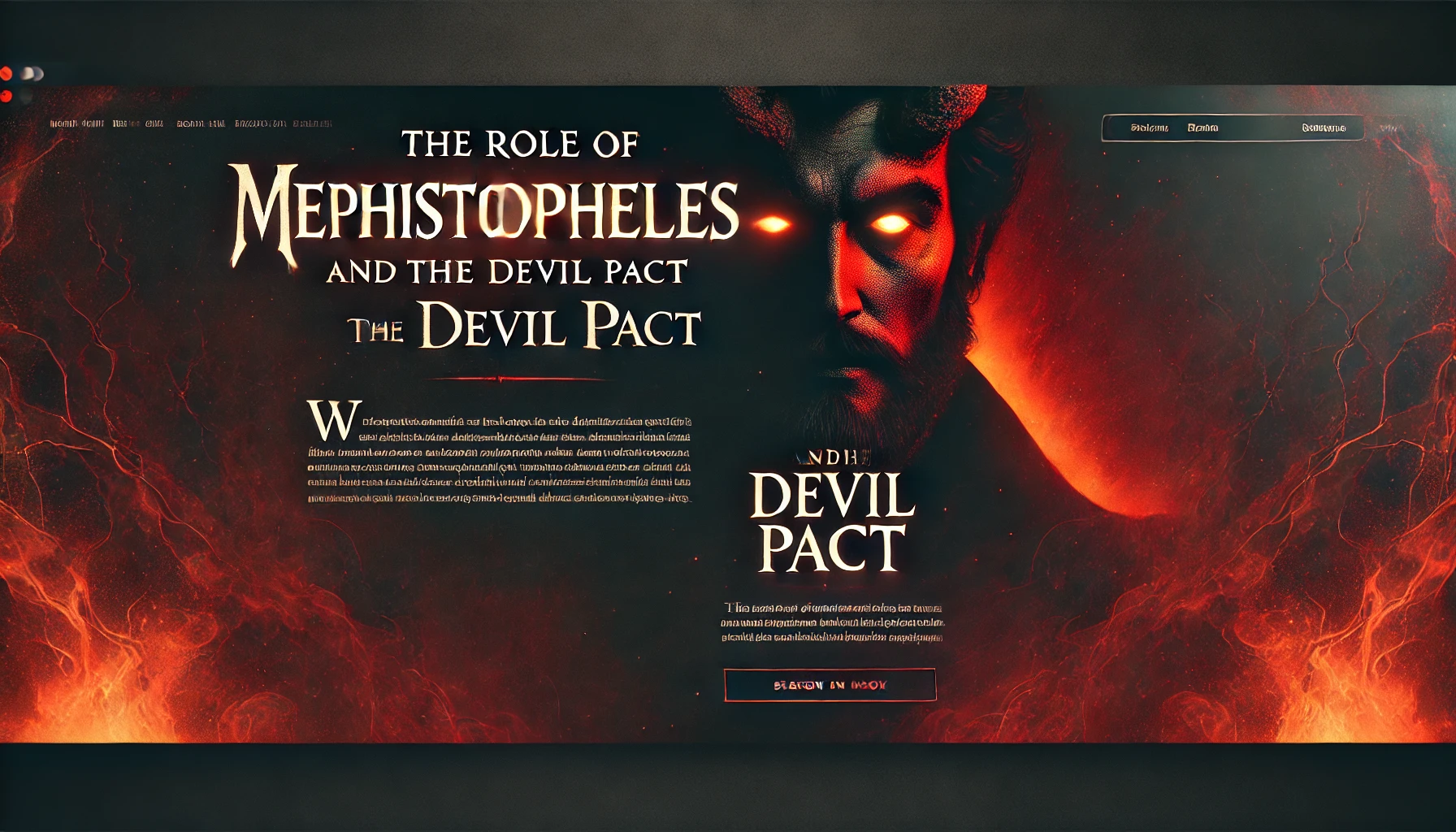

The Role of Mephistopheles and the Devil Pact in Dr Faustus
Supernatural Elements: Good vs Evil, Moral Struggle
Christopher Marlowe’s Doctor Faustus is a play filled with supernatural elements, moral struggle, and the conflict between good and evil. At the center of this struggle is Mephistopheles, a servant of Lucifer who plays a key role in Faustus’s damnation. Through his interactions with Faustus, Mephistopheles embodies the dangers of temptation and eternal damnation. This article explores his role in Faustus’s downfall, the nature of the devil pact in Dr Faustus, and the deeper moral lessons in the play.
Mephistopheles is introduced when Faustus summons him through necromantic rituals. Instead of appearing as a terrifying demon, he arrives in a humble and sorrowful manner, immediately warning Faustus about the horrors of hell:
“O Faustus, leave these frivolous demands,
Which strike a terror to my fainting soul!” (Act 1, Scene 3)
His words suggest that he is not merely an evil tempter, but also a being who understands the pain of damnation. However, Faustus ignores this warning and chooses to proceed with his ambition, seeing Mephistopheles as a servant rather than an equal.
One of the most significant moments in the play is when Faustus signs a contract with Lucifer, offering his soul in exchange for 24 years of unlimited knowledge and power. The contract itself is written in Faustus’s own blood, a symbolic act showing that he is giving up his very essence.
Faustus declares:
“Had I as many souls as there be stars,
I’d give them all for Mephistopheles.” (Act 1, Scene 3)
This statement highlights Faustus’s recklessness and arrogance, showing that he does not fully grasp the weight of his decision. Despite Mephistopheles’s earlier warnings, Faustus believes he can outsmart hell and that his power will bring him lasting happiness.
The supernatural is central to Doctor Faustus, as the play constantly shifts between forces of good and evil. The Good Angel and the Evil Angel symbolize Faustus’s inner conflict, with the Good Angel urging him to repent:
“Sweet Faustus, think of heaven, and heavenly things.” (Act 2, Scene 1)
But the Evil Angel tempts him with pleasures and power, reinforcing the idea that Faustus still has a choice. However, he consistently chooses the path of damnation.
Mephistopheles, while serving Lucifer, is not the active deceiver—Faustus deceives himself. When he asks Mephistopheles about the nature of hell, the demon responds:
“Why, this is hell, nor am I out of it.” (Act 1, Scene 3)
This profound statement suggests that hell is not merely a physical place, but a state of eternal suffering and separation from God. Faustus, however, laughs at this idea, believing he can enjoy both sin and salvation.
As the years pass, Faustus begins to regret his decision, realizing that his powers have brought him no real fulfillment. When he considers repentance, Mephistopheles threatens him and brings visions of hell’s wrath, reinforcing his fear:
“Thou art damned; think thou of hell and despair!” (Act 5, Scene 2)
Faustus, overwhelmed by despair and fear, fails to turn back. Mephistopheles ensures that he remains trapped in his own choices, ultimately leading to his horrific fate.
Mephistopheles plays a dual role in the play—he is both a tempter and a warning figure. While he helps Faustus gain power, he also reveals the consequences of sin, showing that hell is a reality, not just a myth. The devil pact represents Faustus’s ultimate downfall, as he trades eternal salvation for temporary pleasures. In the end, Doctor Faustus serves as a powerful moral warning: true wisdom does not come from forbidden knowledge or power, but from humility and faith. Faustus’s story reminds us that the greatest tragedy is choosing to ignore the truth, even when it is right before our eyes.
#The Devil Pact in Dr Faustus #The Devil Pact in Dr Faustus #The Devil Pact in Dr Faustus #The Devil Pact in Dr Faustus #The Devil Pact in Dr Faustus #The Devil Pact in Dr Faustus #The Devil Pact in Dr Faustus #The Devil Pact in Dr Faustus #The Devil Pact in Dr Faustus
Examination Questions
Read More
Comic Relief & Subplots in Doctor Faustus
Introduction to Dr Faustus and Marlowe
Classical Theatre and Classical Drama
Plot Construction in Pride and Prejudice
Introduction to Fiction and Non Fiction
Of Death — Francis Bacon (Text)
Of Truth Critical Analysis by Sir Francis Bacon
Of Truth by Francis Bacon Summary
Visit Us on our Facebook Page:
Hamlet as a Tragic Hero Shakespeare’s Hamlet is one of the greatest examples of a…
A Detailed Synopsis of Doctor Faustus Below is a detailed synopsis of Doctor Faustus by…
Tradition of Revenge Tragedy in Hamlet Revenge tragedy was one of the most popular genres…
Introduction to Hamlet William Shakespeare is widely regarded as the greatest playwright in English literature,…
Igbo Language and Oral Traditions in Things Fall Apart Chinua Achebe’s Things Fall Apart is…
Tragic Flaw of Okonkwo: A Study in Aristotelian Tragedy In Things Fall Apart, Chinua Achebe…
This website uses cookies.